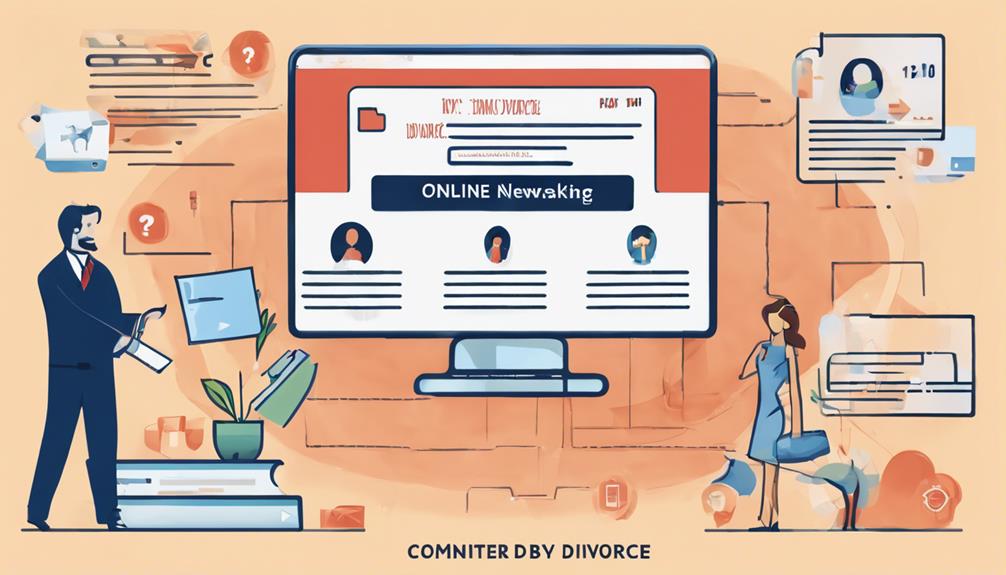To initiate an online divorce in New Hampshire, you will need to collect necessary documents such as financial records. Submit the petition online, pay the fee, and explore the possibility of a fee waiver. Follow court guidelines to properly serve your spouse. Approach the divorce hearing with readiness and respect. Complete the divorce process by submitting the decree. The average cost can be around $1,500. Online divorce provides efficiency, cost savings, and customized forms for uncontested cases. Discover how these steps can assist you in navigating a seamless divorce procedure.
Key Takeaways
- Gather required documents like forms, financial info, and property records.
- File online, pay the fee, and consider a fee waiver if eligible.
- Serve spouse correctly using certified mail or sheriff delivery.
- Prepare for the divorce hearing with proper dress and etiquette.
- Sign and submit the Final Decree for court approval.
Required Documents Gathering
To start the divorce process in New Hampshire, individuals must gather all necessary documents promptly. This includes vital paperwork such as divorce forms, residency requirements, financial information detailing income, assets, debts, and expenses. It's important to collect personal details like names, addresses, and contact information.
Additionally, documentation related to property ownership, investments, and retirement accounts should be obtained. Records of any existing agreements, such as prenuptial agreements, must be secured for reference during the divorce proceedings. Special circumstances or considerations that may impact the divorce should be supported by relevant documents.
Filing the Divorce Petition

Efficiently file for divorce online in New Hampshire using the court's electronic filing system. The process allows individuals to initiate their divorce case conveniently. Remember that the filing fee for a divorce petition in New Hampshire was $250 in 2023.
If financial constraints make it challenging to pay the fee, you can submit a Motion for Waiver of Filing Fee. To prevent delays, make sure that the filing fee payment accompanies your divorce petition.
New Hampshire streamlines the divorce filing process by offering an online platform that simplifies the initial steps. By leveraging the electronic filing system, you can navigate through the paperwork efficiently. Take advantage of this user-friendly approach to kickstart your divorce proceedings in New Hampshire without unnecessary hassle.
Serving Your Spouse
Serving legal documents to your spouse in a divorce is an important step that must be completed correctly to avoid delays in the process. After you file for a no-fault divorce in New Hampshire, you need to serve your spouse with the necessary paperwork. This can be done through various methods such as certified mail, court pick-up, or sheriff delivery. It's vital that your spouse receives a copy of the filed documents to proceed correctly.
Once served, the respondent spouse has 15 days to file an Appearance form in response. Failure to serve the legal papers properly can lead to complications and delays in the divorce process, so it's essential to make sure this step is carried out accurately. By following the correct procedures for serving your spouse, you can help move the divorce process forward smoothly and efficiently.
Attending the Divorce Hearing

When attending the divorce hearing in New Hampshire, individuals should be prepared, follow a specific dress code, and adhere to courtroom etiquette guidelines.
Preparation involves reviewing the divorce agreement, bringing necessary documents, and being ready to address any unresolved issues.
Following the court's guidelines for attire and behavior is essential to maintain a respectful and professional atmosphere during the hearing.
Hearing Preparation Tips
To prepare effectively for your divorce hearing, gather all essential documents and dress professionally to make a favorable impression on the judge. Here are three key tips to help you prepare for your court hearing:
- Bring all necessary documents: Make sure you have the Petition for Divorce, financial affidavits, and any relevant agreements ready for the hearing.
- Dress professionally: Choose attire that's appropriate for a court setting to show respect for the proceedings and make a positive impression.
- Arrive early: Give yourself ample time to navigate parking, security checks, and settle any nerves before the hearing begins. Being punctual demonstrates your commitment to the process and respect for the court's time.
Dress Code Guidelines
For a divorce hearing in New Hampshire, attendees should adhere to a dress code of business casual or professional attire. Individuals must avoid overly casual clothing like jeans, t-shirts, or athletic wear. Opt for neat, clean, and conservative clothing choices suitable for a formal meeting or court proceeding. Remember to steer clear of clothing with offensive language or graphics as a sign of respect for the court environment.
Courtroom Etiquette Dos
Proper courtroom etiquette entails dressing professionally and arriving early for the divorce hearing to demonstrate respect for the legal proceedings. When attending a divorce hearing, it's essential to adhere to certain dos to maintain decorum and show respect for the court process:
- Dress Appropriately: Wear professional attire to show respect for the court and the proceedings.
- Arrive Early: Being punctual allows time for security checks and finding the correct courtroom, showing your commitment to the process.
- Address the Judge: Use the appropriate title 'Your Honor' when speaking to the judge, maintaining a respectful tone throughout the hearing.
Remember to maintain proper courtroom etiquette by avoiding disruptive behavior, turning off electronic devices, and following the judge's instructions respectfully.
Filing the Final Decree

When finalizing a divorce in New Hampshire, filing the Final Decree is an important step.
This involves signing and submitting the decree, which then undergoes a court review process.
Once approved, the parties receive the Final Decree, making the divorce legally binding.
Sign and Submit
To complete the online divorce process in New Hampshire, both spouses must review and sign the Final Decree document before submitting it to the court. The Final Decree details the terms of the marriage settlement agreed upon by both parties, making it an essential document for finalizing the divorce and officially ending the marriage.
Here are three key points to keep in mind during the signing and submitting process:
- Make sure that both spouses thoroughly review the Final Decree to confirm accuracy and agreement with the outlined terms.
- Sign the document once both parties are in concurrence with the terms laid out in the Final Decree.
- Submit the signed Final Decree to the court to mark the completion of the online divorce process in New Hampshire.
Court Review Process
The court review process in New Hampshire involves submitting the Final Decree to formalize the divorce settlement and legally terminate the marriage. This important step requires detailing agreements on property division, alimony, child custody, and support.
By filing the Final Decree, both parties seek the court's approval to finalize the divorce. Once the court reviews and approves the Final Decree, the marriage is dissolved, marking the completion of the divorce process.
This document serves as the binding agreement that solidifies the terms both parties have consented to regarding the separation. Ensuring accuracy and completeness in the Final Decree is essential for a smooth court review process and the subsequent legal dissolution of the marriage.
Receive Final Decree
Upon receiving the Final Decree, the parties involved in the divorce process in New Hampshire move closer to the legal finalization of their separation.
The Final Decree serves as the official court order that solidifies the terms of the divorce settlement. It encompasses vital elements such as property division, child custody arrangements, alimony, and support responsibilities.
By filing the Final Decree, individuals are one step closer to completing the online divorce process in New Hampshire, providing clarity and closure to the dissolution of their marriage.
This document, once signed by the judge, marks the end of the legal proceedings and ensures that both parties understand their rights and obligations moving forward.
Cost Considerations

Considering the average cost of around $1,500, online divorce in New Hampshire provides a cost-effective solution for those seeking to dissolve their marriage. The cost can vary based on the complexity of the case and any additional court fees that may apply. Online divorce services offer a budget-friendly option, especially for uncontested divorces, making the process more accessible to individuals looking for a convenient and efficient way to end their marriage.
| Cost Considerations | |
|---|---|
| Average Cost | $1,500 |
| Complexity | Varies |
| Court Fees | Additional |
Online divorce is particularly beneficial for those abroad or in the military, providing a high-quality service tailored for uncontested cases. By opting for online divorce in New Hampshire, individuals can save both time and money while ensuring accuracy and simplicity in the dissolution of their marriage.
Online Divorce Benefits

Opting for online divorce in New Hampshire presents numerous advantages for individuals seeking a swift and cost-effective dissolution of their marriage.
- Efficiency: Filing for divorce online streamlines the process, making it faster and more convenient for those with uncontested cases in New Hampshire.
- Cost-Effectiveness: Online divorce eliminates the need for extensive legal fees, reducing the financial burden often associated with traditional divorce proceedings.
- Accurate Completion: Online divorce services guide individuals through the completion of divorce forms, ensuring all necessary documents are correctly filled out for filing in New Hampshire courts.
Frequently Asked Questions
What Is the Fastest Way to Get a Divorce in New Hampshire?
The fastest way to get a divorce in New Hampshire is through an uncontested process. It typically has a shorter processing time compared to contested divorces. Utilizing online resources for an uncontested divorce can expedite the process.
How Long Does an Uncontested Divorce Take in Nh?
An uncontested divorce in New Hampshire typically takes 6 to 10 weeks. The timeline varies based on court processing and case complexity. Efficient completion of forms and agreement on key issues can expedite the process.
How Can I Divorce My Husband Online?
To divorce online, individuals can utilize services that provide forms and guidance for a streamlined process. These services offer convenience and cost savings, making it easier to navigate divorce proceedings without the need for extensive in-person interactions.
How Much Does It Cost to Get Divorced in New Hampshire?
Getting divorced in New Hampshire can cost around $1,500, but complexities like property division or child custody may add to the bill. Understanding financial implications is essential for planning. Private investigators could bump costs.
Conclusion
To sum up, managing the online divorce process in New Hampshire involves:
- Collecting required documents.
- Submitting paperwork.
- Notifying your spouse.
- Participating in a hearing.
- Finalizing the decree.
While cost considerations are crucial, the advantages of convenience and effectiveness make online divorce a feasible option.
By following these steps and staying organized, individuals can successfully handle the process with ease and move forward in a more amicable manner.










